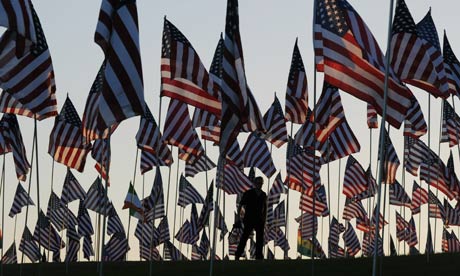
If one believes that Sept. 11, 2001, didn’t upset the world order, then why the media frenzy that we are witnessing on the occasion of its 10th anniversary?
It is on such a scale that it’s hard to believe it isn’t the result of a major historical rupture. The media didn’t do as much for the 20th anniversary of the fall of the Berlin Wall — only a date, yet symbolic of the end of a polarized world. It can already be seen how the topic is being approached. Above all, it is in terms of the emotional feelings or for the memories of the victims that we speak of 9/11. There is very little analysis of the political consequences or strategies concerning the attacks.
Why the emotion?
These attacks weren’t the event that caused the most casualties in recent times. First estimated to be 6,000, the death toll was then reduced to 3,000. This is small compared to the number of victims of the earthquake in Haiti or the tsunami in Southeast Asia. We can be sure, however, that the 10th anniversaries of these events, if they are mentioned, will receive less media coverage. Admittedly, these events are related to natural disasters and less directly to the political sphere. But the tragedy of Bhopal, which wasn’t a natural disaster, did not result in the same type of commemoration. It is also small compared to the nearly five million deaths caused by the conflict in the Democratic Republic of Congo, but that developed over time and isn’t due to a unique event. One could also speak of that other Sept. 11, that of 1973 and the coup d’etat in Chile.
Even if Sept. 11 did not alter the international balance of power, it has definitely created a staggering effect from which we are still recovering today. This explains the gap between the impact on the structure of international relations (weak) and the impact in people’s minds (very strong). It was believed that the United States was invulnerable and unassailable; the Twin Towers belonged to the collective imagination of the world. The event was seen live and was repeatedly shown on television.
If empathy has been shown in an accentuated and continuous fashion, it is definitely because Westerners felt more affected by the events because the victims were Western.
We remember the argument put forward during the Balkan Wars that “ethnic cleansing, just a two-hour plane ride from Paris,” was unacceptable; this implicitly suggests that if it had occurred a little farther away, it would have been acceptable.
Our emotions are always stronger when the media and its leaders — and probably most of the public — more easily identify with the victims. Morality is still a variable geometry, measured not by the number of casualties but by our feeling of closeness.

Leave a Reply
You must be logged in to post a comment.